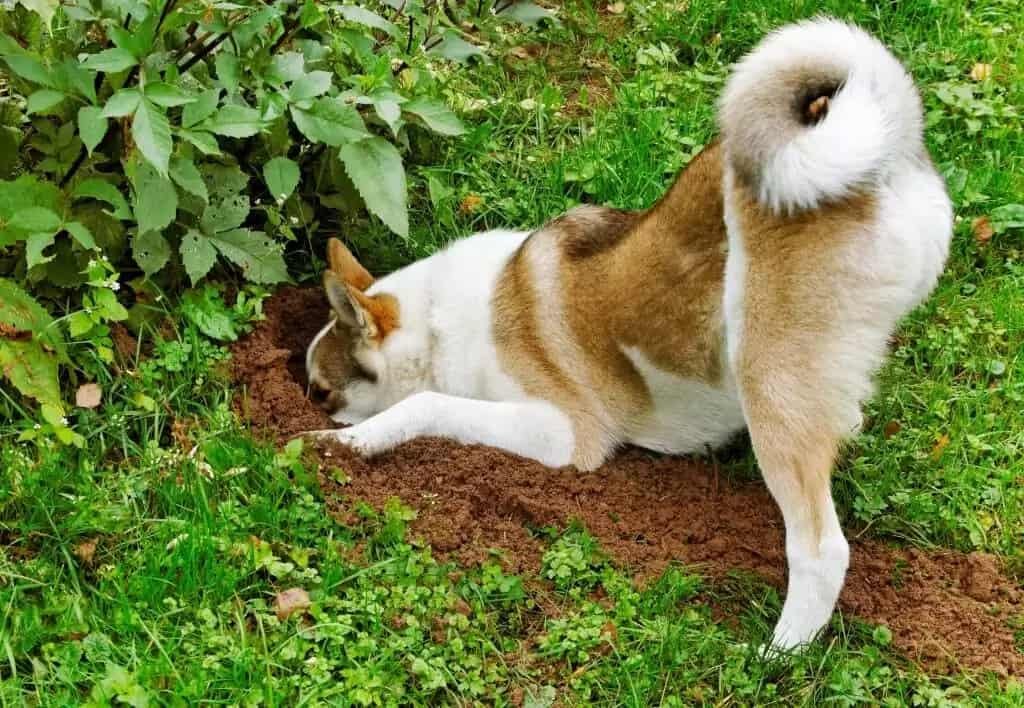Dogs may dig for a variety of reasons, including instinct, boredom, seeking attention, hunting for prey, trying to escape, or trying to find a cooler spot to lie in. Here are some common reasons for dog digging, along with suggestions for how to address the behaviour.
Lack of Stimulation | Why your Dog is Digging?

Dogs are intelligent and active animals that require physical and mental stimulation to stay healthy and happy. When dogs don’t receive enough stimulation, they can become bored and restless, which can lead to destructive behaviours like digging.
There are a few reasons why a lack of stimulation can cause a dog to dig. One reason is that digging is a natural behaviour for dogs. In the wild, dogs dig to create dens for protection and to search for food. When dogs are kept as pets and don’t have the opportunity to engage in this behaviour, they may dig as a way to express their instincts.
Another reason why lack of stimulation can cause a dog to dig is that it can be a way for them to burn off excess energy. Dogs need to be exercised regularly to stay healthy and maintain a healthy weight. When they don’t get enough exercise, they may become restless and start digging as a way to expend some of their energy.
Lack of stimulation can also lead to digging as a way for a dog to entertain itself. Dogs are social animals and need mental and social stimulation to stay happy and healthy. When they don’t receive enough stimulation, they may start digging as a way to pass the time and keep themselves entertained.
To prevent digging due to lack of stimulation, it’s important to make sure that your dog is getting enough exercise, mental stimulation, and social interaction. This can include taking them for walks, playing with them, and providing them with toys and puzzles to keep their minds engaged. It’s also a good idea to give your dog plenty of attention and affection, as this can help to prevent boredom and destructive behaviours.
Predatory Instincts
Dogs can exhibit digging behaviour for a variety of reasons, and predatory instincts may be one of them. Some dogs may dig in an attempt to catch or pursue prey, such as small animals or insects. This behaviour can be more common in certain breeds that were originally bred for hunting or working, such as terriers or hounds.
However, there are many other reasons why a dog may dig. Some dogs may dig as a form of play or exploration, or out of boredom or frustration. Some dogs may dig to create a cool spot to lie in or to escape from something frightening or stressful.
If you are concerned about your dog’s digging behaviour, it is important to try to identify the underlying cause. Providing your dog with plenty of mental and physical stimulation, such as toys, games, and exercise, can help prevent boredom and reduce the likelihood of digging. If you think your dog’s digging may be related to predatory instincts, you may want to consider working with a professional dog trainer or behaviourist to address this behaviour.
Must Read What is a Dog Treat Launcher
Anxiety and Stress
Dogs may dig for a variety of reasons, including stress and anxiety. Some common signs that a dog may be digging due to stress or anxiety. This may be a sign that the dog is trying to escape or seeking attention from people or other animals on the other side of the fence. If a dog is digging in the same spot over and over again, it may be trying to bury or hide something, or it may be seeking comfort from the repetitive motion.
Some dogs may dig when they are left alone, as a way of coping with separation anxiety. If a dog is digging more than usual, it may be a sign that the dog is experiencing stress or anxiety due to changes in its environment or routine, or due to other stressors such as illness or injury.
If you suspect that your dog is digging due to stress or anxiety, it is important to try to identify the cause of the stress and work to address it. This may involve providing your dog with more mental and physical stimulation, helping it feel more secure in its environment, and seeking the help of a veterinarian or a professional dog trainer.
Temperature Regulation

Dogs may dig for a variety of reasons, including temperature regulation. In the wild, dogs may dig dens to protect themselves from extreme temperatures, either hot or cold. Domestic dogs may also dig to create a cooler spot to lie in during hot weather.
If your dog is digging to regulate their temperature, it may do so in areas that are shaded or that have cooler ground, such as under trees or bushes. You may notice your dog digging more frequently during hot weather or when they are outside for longer periods.
It’s important to provide your dog with plenty of access to water and shade when it’s hot outside, as well as a cool place to rest inside your home. If your dog is digging excessively, it may be helpful to provide them with a designated digging area, such as a sandbox, where they can dig to their heart’s content. If your dog’s digging is causing damage to your property or is becoming a problem, it may be necessary to seek the advice of a veterinarian or a professional dog trainer.
Lack of exercise | Why your Dog is Digging?
If a dog is not getting enough exercise, it may engage in destructive behaviours such as digging as a way to burn off excess energy. It’s important to make sure that your dog gets enough physical and mental stimulation daily to prevent them from engaging in destructive behaviours. This can include regular walks, runs, or playtime with toys and games.
Providing your dog with plenty of opportunities for exercise can help prevent them from digging out of boredom or frustration. Additionally, you can try to redirect your dog’s digging behaviour by providing them with a designated digging area or by providing them with toys and activities that allow them to engage in natural digging behaviour in a safe and controlled way.
How to keep your Dogs away from Digging?
If your fur baby is digging for any particular reason, it is time to act. There are several methods you can try to stop a dog from digging:
- Provide plenty of exercises and mental stimulation: One of the main reasons dogs dig is due to boredom or lack of physical and mental stimulation. Make sure your dog is getting enough exercise and has plenty of toys and activities to keep them entertained.
- Create a designated digging area: If your dog loves to dig, consider setting aside a specific area in your yard where they can dig to their heart’s content. This will give them a place to satisfy their digging instincts and prevent them from digging in other areas of your yard.
- Use physical barriers: To prevent your dog from digging in certain areas of your yard, you can try using physical barriers such as fencing, chicken wire, or landscaping fabric. These barriers can help to keep your dog out of certain areas of your yard.
- Train your dog to dig on command: Another option is to train your dog to dig on command. This can be done by teaching them a specific command, such as “dig,” and rewarding them with treats and praise when they dig in their designated digging area.
- Use deterrents: If your dog is digging in a specific area, you can try using deterrents such as spraying the area with a mixture of water and lemon juice or placing objects such as plastic forks or chicken wire in the soil to make it uncomfortable for them to dig.
- If your dog is digging excessively or in unusual places, it may be a sign of an underlying medical issue such as an infection, pain, or an allergic reaction. Consult with your veterinarian to rule out any potential health issues.
- Seek help from a professional: If you’re having trouble stopping your dog from digging, it may be helpful to seek the help of a professional dog trainer or behaviourist.
Remember, it’s important to be patient and consistent when trying to stop your dog from digging. It may take some time and effort, but with the right approach, you can help your dog learn to stop digging and instead engage in more appropriate behaviours.


